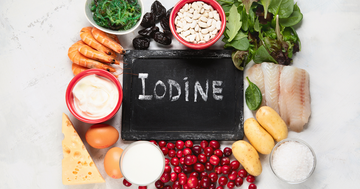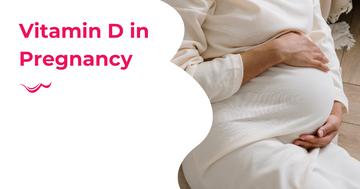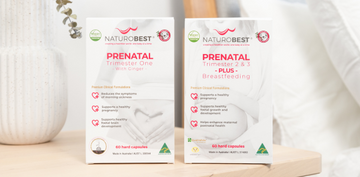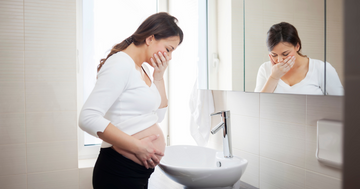
Iodine deficiency is widespread in Australia and NZ. This is due to deficient soils and an iodine deficient diet. Compared to other countries where foods like seaweed and fish are eaten on a daily basis.
It’s well established that iodine supplementation is one of the essential building blocks in pregnancy. Especially if you want to optimise your baby’s brain function [1-3]
A maternal deficiency can lead to goitre, cretinism and congenital anomalies. As well as miscarriage, stillbirth, an infant with a lowered IQ, learning difficulties, motor skill problems and hearing difficulties [4]
An unfortunate design fault in the human body is that a pregnant woman has an increased renal clearance of iodine. Maintaining normal thyroid function during pregnancy is challenging and requires continual access to dietary iodine [5]
Foods high in iodine include eggs, fish and other seafood. Miso soup with seaweed and iodised salt or Himalayan crystal salt. Himalayan salt has 100mcg in ¼ tsp compared to 71mcg in ¼ tsp of iodised salt.
The RDI of iodine in pregnancy is 220mcg. It is important to note that during the first trimester it is not a good idea to over-stimulate the thyroid. Which can occur through iodine supplementation.
The pregnancy hormone, HCG naturally stimulates the thyroid. This happens in the first trimester (normalising in the second trimester) and this is known to aggravate the symptoms of morning sickness [6, 7]
Another interesting study showed that supplementing with more than 200mcg of iodine in the first half of pregnancy. Led to an increased risk of hypothyroidism later in pregnancy. [8] So we don’t want to overstimulate nor suppress thyroid function.
The World Health Organisation recommends supplementing with 150mcg of iodine. During pregnancy and that is the daily dose in our Prenatal Trimester One.
The best way of assessing iodine status is through thyroid function tests (blood test). A urinary iodine test is good for assessing how much iodine you are getting from your diet. But it is not a useful tool for diagnosing total body iodine status.
References
Monahan, M., et al., Costs and benefits of iodine supplementation for pregnant women in a mildly to moderately iodine-deficient population: a modelling analysis. The Lancet Diabetes & Endocrinology, 2015. 3(9): p. 715-722.
- Sukkhojaiwaratkul, D., et al., Effects of maternal iodine supplementation during pregnancy and lactation on iodine status and neonatal thyroid-stimulating hormone. J Perinatol, 2014. 34(8): p. 594-8.
- Morse, N.L., Benefits of docosahexaenoic acid, folic acid, vitamin D and iodine on foetal and infant brain development and function following maternal supplementation during pregnancy and lactation. Nutrients, 2012. 4(7): p. 799-840.
- Hamaoui, E. and M. Hamaoui, Nutritional assessment and support during pregnancy. Gastroenterol Clin North Am, 2003. 32(1): p. 59-121, v.
- Forbes, S., Pregnancy sickness and parent-offspring conflict over thyroid function. J Theor Biol, 2014. 355: p. 61-7.
- BALLABIO, M., POSHYACHINDA, M. & EKINS, R.P., Pregnancy-induced changes in thyroid function: Role of Human chorionic gonadatropin as putative regulator of maternal thyroid Journal of Clinical Endocrinology & Metabolism, 1991. 73(4): p. 824-831.
- Luetic, A.T.M., B., Is hyperthyroidism underestimated in pregnancy and misdiagnosed as hyperemesis gravidarum? Medical Hypotheses, 2010. 75(4): p. 383-386.
- Rebagliato, M., et al., Iodine intake and maternal thyroid function during pregnancy. Epidemiology, 2010. 21(1): p. 62-9.



